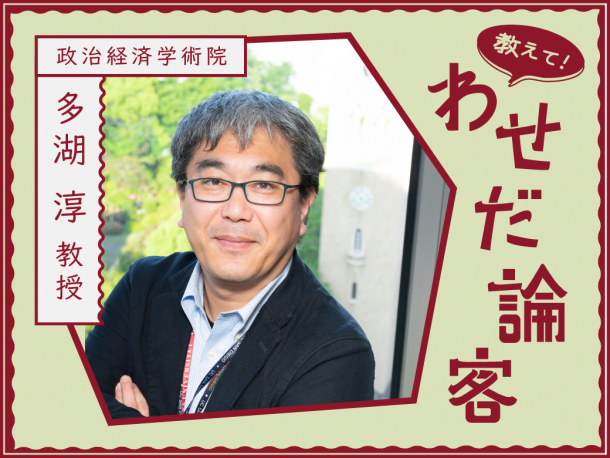
Many Waseda University students may think that social issues are somewhat difficult to approach. In the new corner, "Lectures by Experts'', we will focus on specific problems facing society and ask four Faculty to give us hints on how to solve them.
The theme for 2023 is "How to Keep the Peace?" The second guest will be a scientific commentator on international political phenomena. The second guest will discuss international political phenomena from a scientific perspective, Atsushi Tago Professor (Faculty of Political Science and Economics). Part 1: Responses to the theme and other topics In the second part of this interview, we asked him about his specialty, his current research, and his message to Waseda University students.
Prof. Tago, what kind of skills do you need to survive in the future international society?
It is important to be aware that if we become too obsessed with ``isms'' in an ideological sense, we may not be able to have an objective discussion because we are only talking about claims and doctrines, and when expressing our opinions, it is important to show evidence using data.
It is important to express opinions based on data, not based on feelings or emotions.
Please tell us more about Professor Tago's specialty, "econometric analysis of international political phenomena."
This is research that analyzes and visualizes wars and conflicts using data. If we can use data to visualize the reasons why wars occur and the patterns in which they end, we may be able to find ways to stop them.
For example, analyzing past data reveals that wars are more likely to occur between neighboring countries. If you look at the statistical data, you can see that countries that go to war with distant countries are relatively rare.
In addition, the ``democratic peace theory'' became popular in the 1980s, but recent data analysis has revealed that promoting democratization does not necessarily lead to peace. The ``Democratic Peace Theory'' is based on the ``common sense theory'' that wars are less likely to occur between democracies because information is highly transparent, and this theory is based on James Fearon's ``Rational Causes of War Theory'' (see the first part), it seems reasonable. However, in democracies with elections, politicians tend to create crises for themselves by inciting patriotism in order to gain popularity, and this is because the incentive to engage in marked adventurism increases during the democratization process, and this is statistically significant. It has been found that this poses a high risk factor. As a result, even societies that aspire to democracy are prone to war, especially during periods of transition from dictatorships.
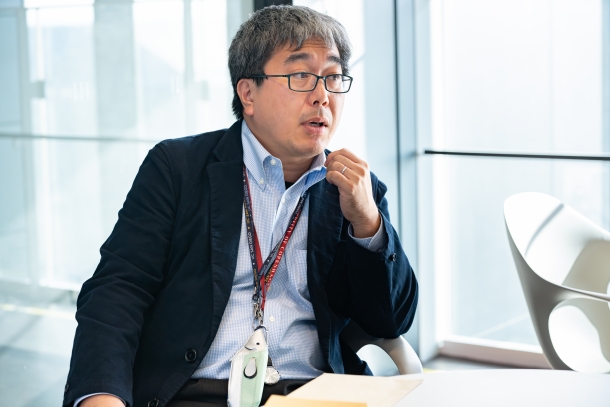
The person who created the basic dataset for scientific analysis of war and peace was my mentor, an international political scientist at the University of Michigan named J. David Singer. This database is known as the "Correlates of War" project, and many studies still rely on this data to count wars and armed conflicts, and aggregate various information related to them. .
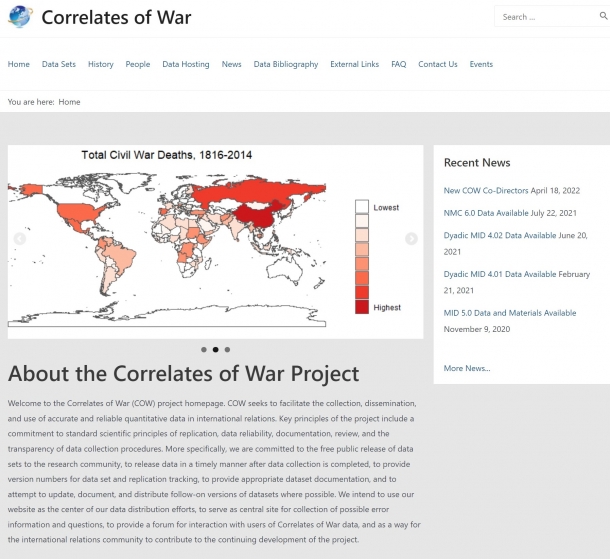
Correlates of War website screen (from https://correlatesofwar.org/)
What kind of research are you specifically involved in?
Until around 2013, so-called regression analysis was used to analyze whether the use of force was carried out individually or from multiple angles, and to analyze data regarding coalitions and alliances of the willing. The content of my research on the use of force in the United States has been cited many times in reports by the RAND Corporation (*), and I feel that it has a policy impact. On the other hand, it is sad that such research written in English is rarely referenced in Japan.
(*) A leading security policy think tank in the United States.
Currently, I am conducting a variety of research on wars between nations, focusing more on experimental methods than regression analysis. For example, data can be used to visualize cases such as how much concessions two countries can make in a territorial dispute, and how much a politician can maintain the approval ratings even after making concessions. Politicians trying to save face is called ``face-saving'', and we are analyzing how politicians can ``face-saving'' while withdrawing from a state of war by incorporating an experiment into a public opinion poll.
In addition to our research based on public opinion polls, we are also investigating questions such as ``How many people in Japan believe that nuclear weapons should not be possessed or used?'' A survey conducted in Japan by a Japanese NPO found that the percentage of people who affirmed nuclear possession ranged from 9% to around 10% at most, but upon further investigation, it turned out that the survey method used was less anonymous. Turns out. When my laboratory conducted a highly anonymous questionnaire using the Internet, the percentage of respondents who supported nuclear weapons rose to 20-33%.
Data analysis shows that even in Japan, the only country in the world to have suffered from atomic bombings, nearly 30% of the people think positively about possessing nuclear weapons. It is very important to obtain objective data correctly. . It is important to express opinions based on data, rather than speaking based on feelings or emotions.
All Waseda University students can use Qualtrics, an online survey creation and analysis tool, free of charge. I would like them to take full advantage of this environment in their own research.
Researchers can offer science-based prescriptions for peace
It seems that you are currently leading a project called DPPS at Waseda University.
Currently, I am playing a central role in the ``Tago DPPS Research Center Construction Project''. DPPS stands for ``Dual Positive Peace Science,'' and its purpose is to ``build an Asia-Pacific regional research base for scientific international politics researchers centered on security.''
I have strong concerns that the current Asia-Pacific region is approaching war in terms of ``war and peace.'' In response, researchers believe they can offer science-based prescriptions. To this end, I believe we need a framework in which researchers in the Asia-Pacific region can create networks and engage in research. I believe that Waseda University, where students from all over the world gather and engage in discussions, is the perfect base for this research.
Photo left: With Associate Professor Shoko Obama of Hokkaido University at a symposium at the University of Hong Kong (2019)
Photo right: Regular study session with researchers from various countries specializing in conflict research in Brussels, Belgium (2014)
Are there any future studies or data analyzes you would like to carry out together with your students?
Currently, I am conducting research on ``dissatisfaction'' in countries in the Asia-Pacific region. I would like to conduct public opinion polls using the Internet in countries such as Japan, China, Taiwan, and Vietnam, and think about how we can create a situation in which people do not see the other party as an enemy, and I would also like to visualize this through data. It is natural for the citizens of each country that has been stirred up to feel anxious to feel a sense of crisis. However, if we do not curb military expansion and move towards disarmament at some point, society will collapse.
This is similar to the ``face saving'' mentioned earlier, but if we can find a way to reduce disarmament without causing dissatisfaction among the people, it would be of great significance in the current Asia-Pacific region.
Prof. Tago's introduction video. Also includes an explanation of the “Tago DPPS Research Center Construction Project”
Lastly, please give a message to students who will survive in the international society in the future.
Traditionally, international politics has been dominated by discussions based on ``isms'' such as realism and liberalism. However, if we get too caught up in ``isms,'' there are cases in which we are unable to have an objective discussion because we are focused on principles and claims. When expressing an opinion, by showing evidence using data in a deductive manner, the quality of the discussion will be completely different.
The debate over "how to protect peace" is no exception. I believe that deepening logical discussions based on scientific data is essential in international politics as well.
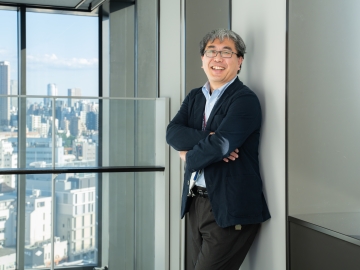
Atsushi Tago
Professor Faculty of Political Science and Economics. Ph.D. (academic), University of Tokyo. Tago's field of expertise is international politics. Tago's main interests are U.S. diplomacy, alliances and coalitions of the willing, and quantitative methods, and Prof. Tago has been working on quantitative analysis of international political phenomena, particularly in recent years using quantitative text analysis and survey experiment methods.
Official website: https://a-tago.github.io/
Interview and text: Kenichi Marumo
Photography: Yusuke Fukahori
Image design: Ryo Uchida
▼Click here for the first part!
"How do you protect peace?" Tell me! Professor Tago (Part 1)

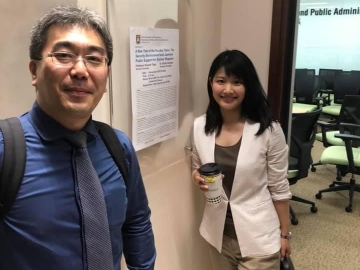
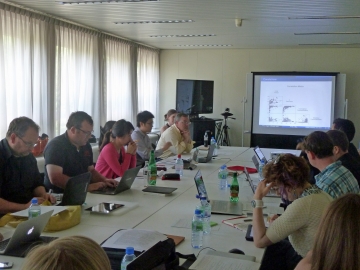
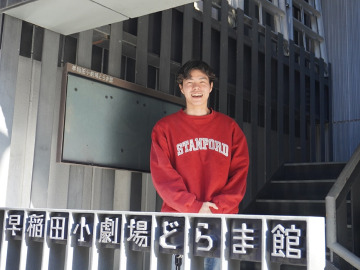

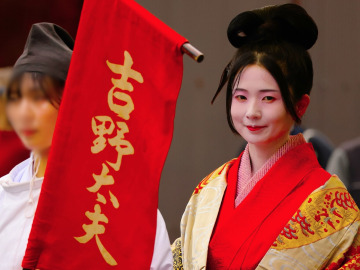
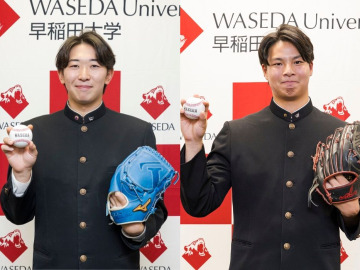

![[Save version] Map of the four main campuses](https://www.waseda.jp/inst/weekly/assets/uploads/2025/09/17cb2975123fc5103172ef60bd98608d-610x458.jpg)

